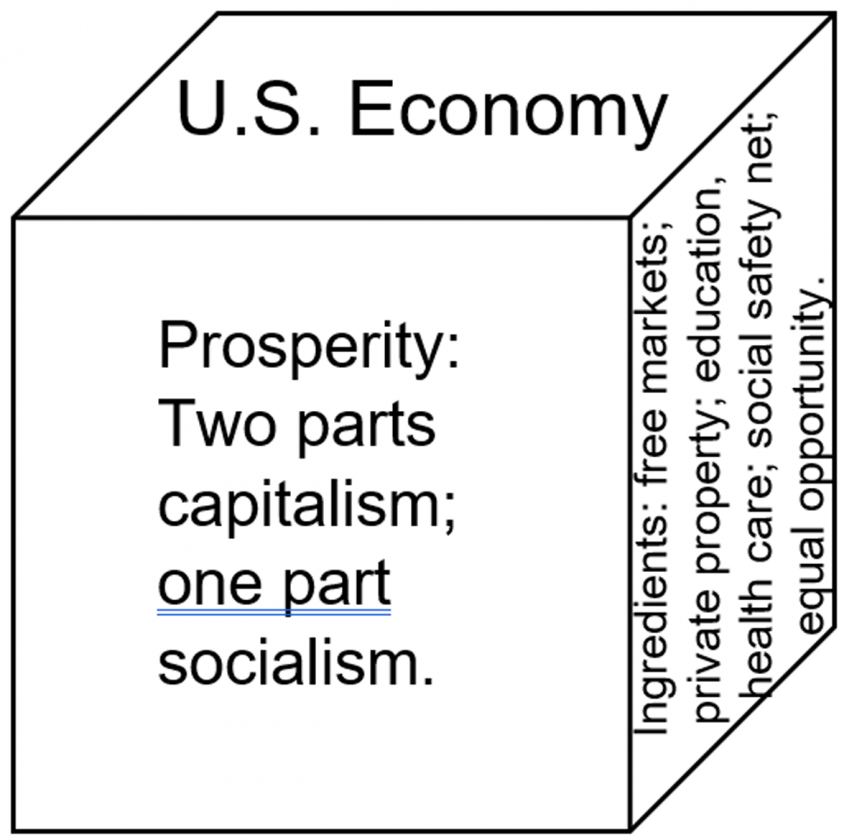U.S. economy: two parts capitalism; one part socialism

Presidential campaigns have been ramping up. The political rhetoric and nonsense about which candidates are capitalists and which are socialists has also been ramping up. In his 2019 State of the Union address, President Donald Trump remarked, “Here in the United States, we are alarmed by the new calls to adopt socialism in our country. America was founded on liberty and independence, and not government coercion, domination, and control. We are born free and we will stay free. Tonight, we renew our resolve that America will never be a socialist country.”
Although America is not considered a socialist country, the U.S. “adopted socialism” in the preamble of the Constitution with the goals to “provide for the common defence” and to “promote the general Welfare.”
In contrast to the president’s feigned alarm over socialism, several democratic-party presidential contenders are embracing policies dubbed as socialistic including the Green New Deal, Medicare-for-all, free college tuition, and slavery reparations. How they expect to pay for all that is a mystery, though, especially given current record-setting federal government deficits and debt.
Don’t be fooled. This is not an either-this-or-that type of choice. Free-market, capitalistic institutions and socialistic institutions can and do exist side-by-side, especially in the U.S. In a recent opinion piece in the New York Times, the renowned, Nobel prize-winning economist Paul Krugman noted the U.S. is about two-thirds capitalistic and one-third “sort-of-kind-of socialist.” His “back of the envelope” estimates are based on government employment as well as private-sector employment that is largely paid for by public money.
Of course, the U.S. is more capitalistic than socialistic, and it’s likely you are more of a capitalist than a socialist.
—
Are you a socialist?
To cut through some of the nonsense, let’s consider whether you are partly socialist and whether you benefit from socialistic elements of our economy. Do you support the U.S. government maintaining a military to provide for the common “defence” of its citizens? Yes? Then you are partly socialist. Have you driven or ridden on a local, state, or interstate highwaylately? If so, you’re a socialist. Walked on the sidewalk lately? You’re a socialist. Do you receive municipal water and sewer services? You’re socialist. Do you support local primary and secondary schools? You’resocialist. Support public colleges? You’re a socialist. Tupper Lakers do you support the Tupper Lake Municipal Electric Department and the low-cost electricity you receive? You’re a socialist. The same goes for Lake Placid residents and your Village Electric Department. Harrietstown residents do you pay taxes to support the Lake Clear airport? You’re a socialist. Of course, I could go on-and-on-and-on, but you get the point.
Obviously, we all support and benefit from socialist elements of our economy. Don’t be too downhearted, though, you are not a flawed human being just because you support socialistic institutions such as those I mentioned above. Instead, take heart, it is the simpletons who fail to recognize our socialistic institutions and who demonize anyone who does. When you hear politicians demonizing socialistic institutions, they are demonizing part of you!
—
The case for capitalism and socialism
Billionaire hedge-fund manager and philanthropist, Ray Dalio, recently called for the reform of American-style capitalism in his appearance on the television show “60 Minutes” and in a two-part posting on LinkedIn. Mr. Dalio noted in his LinkedIn article, “most capitalists don’t know how to divide the economic pie well and most socialists don’t know how to grow it well.” His article includes compelling statistics that show, for many, the American dream is lost; most people in the middle- and lower-income classes now have littlehope of improving their economic status. Dalio notes “it doesn’t take a genius to know” capitalism needs to be reformed and his ” … big worry is that the sides will be intransigent in their positions so that capitalism will either a) be abandoned or b) not be reformed because those on the right will fight for keeping it as it is and those on the left will fight against it.” Mr. Dalio puts his money where his mouth is. He and his wife and their “philanthropy team are now working on an agreement in which the Dalio Philanthropies will donate $100 million to programs for the most underfunded school districts and for microfinance in Connecticut if the state donates $100 million and if other philanthropists and businesses in Connecticut also donate another $100 million.”
Similarly, in a letter to stockholders, Jamie Dimon, Chairman and CEO of JP Morgan Chase bank, noted “Capitalism enables competition, innovation and choice. This is not to say that capitalism does not have flaws, that it isn’t leaving people behind and that it shouldn’t be improved. It’s essential to have a strong social safety net – and all countries should be striving for continuous improvement in regulations as well as social and welfare conditions.”
Our capitalistic and socialistic institutions complement each other; the right mix makes us stronger not weaker.



